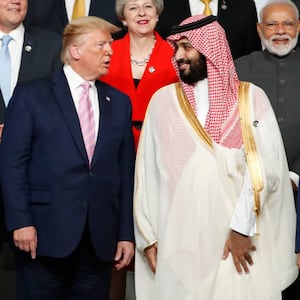In just four years, Donald Trump has been involved in so many shameless American episodes that it’ll take documentarians decades to examine them all. On the heels of this month’s Agents of Chaos (about Russian interference in the 2016 election) and ahead of November’s Totally Under Control (concerning the ongoing pandemic), the tireless Alex Gibney continues to make headway on that endeavor by focusing on yet another tale that reflects damningly on our commander-in-chief: that of Jamal Khashoggi, the Saudi Arabian Washington Post journalist who was assassinated in horrific fashion on the orders of Crown Prince Mohammed bin Salman—an atrocity that Trump did nothing to stop, refused to censure, and basically ignored so he could remain on good terms with his fellow autocratic pal.
Executive produced by Gibney and directed by Rick Rowley, Kingdom of Silence (premiering Friday, Oct. 2 on Showtime) doesn’t get to its Trump castigation until late. For the most part, the 97-minute documentary is a portrait of Khashoggi’s tumultuous career, and the ways in which it dovetailed and clashed with Saudi-U.S. relations over the last four decades. His is a story defined by the push-pull between loyalty and love for country, and belief in freedom for all—a friction that became more fraught following 9/11, and came to a head on Oct. 2, 2018, when he was murdered and dismembered by MBS’s henchmen in the Saudi consulate in Istanbul, Turkey.
Khashoggi rose to prominence thanks to his reporting on the 1980s Soviet-Afghan War, during which he met and befriended a young Saudi-born fighter named Osama bin Laden and, according to Kingdom of Silence, turned the revolutionary into Saudi Arabia’s first genuine celebrity. A supporter of the Saudi royal family’s regime, which was working hand-in-hand with America to back the Afghan mujahideen in their fight against the communists, Khashoggi had journalistic access like no other. In a country where being close to the seat of power was the key to success—and longevity—Khashoggi became the country’s most famous reporter.
The bond between Khashoggi and Saudi Arabia’s ruling elite was initially strengthened by 9/11. In one of many sequences set to Khashoggi’s writing (narrated by Nasser Faris), we hear the writer lament about the murderous bin Laden, “You were beautiful and brave in those beautiful days in Afghanistan, before you surrendered to hatred and rage,” thus sending the Muslim world “straight into the jaws of hell.” Disillusioned about bin Laden, Khashoggi moved further into the royal family’s corner, whose political and economic ties to the U.S. ran deep. Using Khashoggi’s own trajectory as its framework, Rowley’s film details how American administrations have habitually nurtured and championed relations with Saudi Arabia, in large part because of the need (and desire) for oil, as well as for a strong partner in a region brimming with terrorist enemies. In that respect, it’s a primer on the justifications for, and compromises necessitated by, getting into bed with the devil.
For Khashoggi, the good times were not to last, since despite his affiliation with some of his nation’s most powerful princes—including Prince Turki al Faisal—the journalist’s democratically inclined views eventually got him into hot water. When the Arab Spring broke out, Khashoggi viewed it as a possible tipping point toward seismic reform. The fact that Saudi Arabia (with U.S. support, and indifference) crushed those protests drove a further wedge between the Saudi native and his homeland. When newly installed King Salman and his son MBS subsequently shut down his independent news network Al-Arab after just one night of broadcasting, Khashoggi understood his time was up, and he had to flee.
That he did, to the United States, where he began penning editorials for The Washington Post that were critical of Saudi Arabian policies. It was no surprise that this didn’t sit well with the royal family. Yet Kingdom of Silence carefully avoids painting its subject as simply an I-have-seen-the-light sort of crusader. Rather, it recognizes that Khashoggi’s increasingly outspoken stance toward the Saudis was the byproduct of both his lifelong support for freedom of expression, and his recognition (and fear) of MBS’s authoritarian consolidation of power and mounting war crimes (most notably in Yemen). Through interviews with friends, colleagues and Khashoggi’s widow Hanan, Rowley conveys the tormented strain that this position had on Khashoggi, who loved and deeply missed Saudi Arabia.
Trump’s election was central to Khashoggi’s alienation from Saudi Arabia, since the U.S. president went out of his way to demonstrate to the world that MBS was his guy in the region—a reality underlined by Trump choosing Saudi Arabia as his first post-inauguration overseas destination. When the Trump administration shrugged off MBS’ crackdown on dissent, including arresting numerous princes, businessmen and intellectuals and imprisoning them in Riyadh’s Ritz-Carlton, it proved to Khashoggi that he was now firmly on the outside looking in. His first Washington Post editorial, “Saudi Arabia Wasn’t Always This Repressive,” put a target squarely on his back, especially since he was arguably the most knowledgeable person alive about the Saudis’ financial ties to bin Laden’s 9/11 hijackers (15 of whom were Saudis). Just over a year later, while living in Istanbul—and attempting to procure a marriage license—he was lured to the consulate where MBS’ assassins monstrously ended his life.
To some, such as Trump, maintaining the U.S.-Saudi union was far more important than Khashoggi’s life; as diplomat David Rundell baldly states, “Saudi Arabia is a strategic ally, and I do think that outweighs the death of one person. Yes, it does. So there’s a paid political commercial for Mohammad bin Salman. But I believe that. So in any event, there you go. I thought that needed to be said.” (Trump himself, on the Bob Woodward tapes, boasted of “saving” MBS’ reputation following the Khashoggi murder.) Others, unsurprisingly, feel quite differently about the loss of this courageous journalist, who spoke truth to a nation one tiny step removed from tyrannical theocracy. Employing a stock mix of interviews, archival news clips, and old interviews with Khashoggi (as well as excerpts from his writing), Kingdom of Silence investigates its story in a formally generic manner. Nonetheless, aided by an impressive roster of participants (including John Brennan and Richard Clark), it provides a clear and enraging picture of the tangled geopolitical dynamics which Khashoggi helped define, and which ultimately ensnared him.



